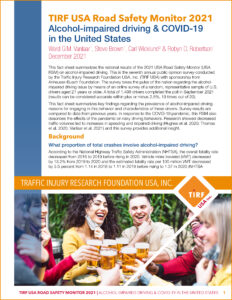Washington, DC, December 29, 2021 (GLOBE NEWSWIRE) — The Traffic Injury Research Foundation USA, Inc. (TIRF USA), in partnership with TIRF in Canada and with sponsorship from the Anheuser-Busch Foundation, released the seventh annual Road Safety Monitor (RSM) on alcohol-impaired driving. The survey takes the nation’s pulse regarding the alcohol-impaired driving issue through an online survey of a random, representative sample of U.S. drivers aged 21 years or older. A total of 1,498 drivers completed the poll in September 2021. This fact sheet summarizes key findings regarding the prevalence of alcohol-impaired driving, reasons for engaging in this behavior and characteristics of these drivers. Survey results are compared to data from previous years. In response to the COVID-19 pandemic, this RSM also describes the effects of the pandemic on risky driving behaviors.

According to the National Highway Traffic Safety Administration (NHTSA), the overall fatality rate decreased from 2016 to 2019 before rising in 2020. Alcohol-impaired driving fatalities declined 5.3% with 10,142 lives lost in 2019 compared to 10,710 in 2018. Alcohol-impaired driving fatalities also represented the lowest percentage of all driving fatalities in 2019 since alcohol data was first collected in 1982. More concerning, preliminary data from the first half of 2021 showed a 13.0% increase in vehicle miles traveled (VMT) compared to the first half of 2020, yet the fatality rate per VMT increased 18.4%.
Results of the RSM also show almost three in five U.S. drivers (59%) reported they were very or extremely concerned about the pandemic. Comparatively, 65% of U.S. drivers indicated they were very or extremely concerned about alcohol-impaired driving. In addition, 78% of U.S. drivers agreed alcohol-impaired driving was a serious problem.
“Despite this high level of concern about alcohol-impaired driving, more U.S. drivers reported often driving when they thought they were over the legal limit in 2021 than in 2019,” shares Ward Vanlaar, COO of TIRF Canada and lead author of the study. “It’s concerning that the primary reason for drivers reporting this behavior was they believed they were okay to drive, which suggests they do not understand the impairing effects of alcohol on driving or the risk they pose to themselves and other drivers on the road.” While the poll also revealed 7.4% of U.S. drivers thought there was no alternative to driving compared to 11.9% in 2020, there was a small increase in drivers who believed they wouldn’t get caught (10.4% in 2021 as compared to 9.1% in 2020).
Still, in 2021, three of four respondents (75.9%) indicated they had been a designated driver, used a designated driver, used a taxi or public transportation or ridesharing (75.7% in 2020). However, this is a notable decrease from 82.3% in 2019. “A fear of exposure to the COVID-19 virus through close contact may have affected the use of safe rides with the use of both public transit and ridesharing decreasing during the pandemic,” says Vanlaar. “Regardless, it’s imperative people understand the use of safe rides remains a safer option than choosing to drive impaired.”
In addition to this reticence to use shared modes of travel, other impacts of the pandemic on driver behaviour continued in 2021. Results of the poll comparing behavior during the pandemic to behavior before the pandemic show:
- 5% of drivers indicated they were more likely to drive within two hours of consuming alcohol
- 7% said they were more likely to excessively speed during the pandemic
- more than 8% were more likely to drive distracted, drive within two hours of using drugs, and not wear a seatbelt
The full impact of the COVID-19 pandemic on road safety is yet to be revealed, but its effects on drinking and driving are alarming according to these survey results. “Most concerning is results showing males 21-29 years old represent the highest percentage of drunk drivers,” cautions Wicklund. “They most often do this because they think they might still be “okay” to get behind the wheel of a car. Continued enforcement and increased awareness are needed to curb this trend.”
The poll demonstrates enforcement strategies to reduce and prevent alcohol-impaired driving must be adapted accordingly, as a small but notable proportion of drivers were more likely to drive impaired. This may be a new group of drivers who were previously not engaging in this behavior, the same group of drivers who became even more prone to driving alcohol-impaired, or a combination of both. As an increasing number of resources are focused on the health of Americans during the pandemic, targeted education and enforcement efforts to reduce and prevent impaired driving are essential to lessen the burden of the issue, especially in light of the current road safety climate.
Download fact sheet: TIRF USA Road Safety Monitor 2021 Alcohol-impaired driving & COVID-19 in the United States
About the poll
These results are based on the 2021 TIRF USA RSM, an annual public opinion survey developed and conducted by TIRF USA, in partnership with TIRF in Canada. A total of 1,498 drivers in the U.S. completed the poll in September 2021 (results can be considered accurate within plus or minus 2.5%, 19 times out of 20). The data were stratified and weighted by sex, age, and region. The majority of the questions were answered using a scale from one to six where six indicated high agreement, concern, or support and one indicated low agreement, concern, or support, as well as numerous yes/no questions. All respondents completed the survey online.
About TIRF USA
The mission of the Traffic Injury Research Foundation USA, Inc. (TIRF USA) is to develop and share the knowledge that saves – preventing injuries and loss of life on American roads, reducing related social, health and insurance costs, and safeguarding productivity. TIRF USA is an independent road safety research institute that obtained 501(c)3 non-profit status in the U.S. in 2014 and is affiliated through an exchange of services agreement with TIRF in Canada, established in 1964. Visit us online at www.tirf.us or twitter.com/tirfusainc
About the Anheuser-Busch Foundation
Established in 1975, the Anheuser-Busch Foundation focuses on supporting organizations that help individuals and communities thrive. The Foundation contributes to countless community organizations every year in support of disaster preparedness and relief, economic development, education, environmental sustainability, military personnel and responsible drinking. Anheuser-Busch and its foundation are united by an unwavering commitment to supporting the communities that they call home and over the last 30 years, Anheuser-Busch and the Anheuser-Busch Foundation have donated more than $600 million to charitable organizations across the country. For more information, visit www.anheuser-busch.com.
For more information, please contact:
TIRF USA Inc. Corporate Office
20 F Street, 7th Floor, Washington, DC 20001
Tel.: 202-507-6334
Website: www.tirf.us
Email: tirf@tirf.us
